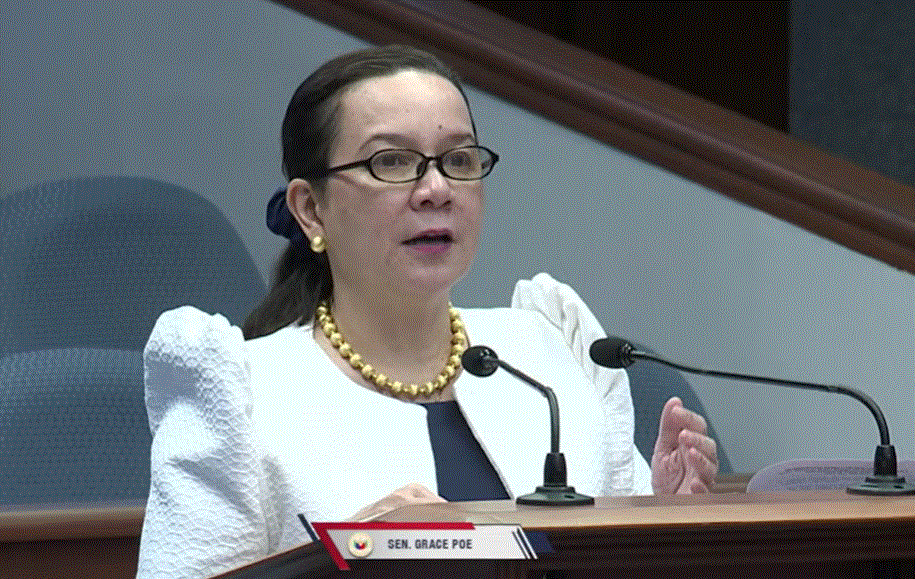Bill creating Dep't of Water Resources reaches Senate plenary

The bill creating the Department of Water Resources (DWR) has progressed in the Senate after it was sponsored in the plenary on Monday.
Senator Grace Poe, principal sponsor of the measure, said the Senate bill is a product of five years of endless studies, consultations, and extensive dialogues with water sector agencies, including finance and management experts, private sector representatives, technical water experts from overseas, and relevant stakeholders.
According to Poe, Senate Bill No. 2771 contained in Committee Report No. 281 seeks to address the water crisis in the country, which is rooted not in the scarcity of resources but in mismanagement.
"Dahil nga sa kawalan ng masterplan, our water sector has operated like flawed and aging water pipes. Our pipes have been laid down in a haphazard manner, just like our water sector which has overlapping agencies and fragmented management. Without a clear framework to guide us, solutions have been limited to rearranging pipes and patching up leaks," Poe said.
The bill seeks to streamline the functions of 45 executive agencies composed of 16 departments, 16 attached agencies and the academe, and 14 bureaus or offices that handle "overlapping or sometimes even conflicting functions on water."
On top of this, there are around 700 water districts and thousands of local government units, private entities, and community-run water suppliers.
Under the bill, the DWR shall be the crucial apex body that will lead the water sector as it will serve as the primary policy, planning, coordinating, implementing, monitoring, and administrative entity responsible for the comprehensive, sustainable, climate-resilient, and integrated development and management of the water resources of the country, and their optimal allocation and use.
The proposed DWR will fully absorb the National Water Resources Board (NWRB); Local Water Utilities Administration (LWUA); DILG's Water Supply and Sanitation Unit; and DENR's River Basin Control Office, Manila Bay Coordinating Office, and Water Resource Management Office
The functions of the DPWH on the National Sewerage and Septage Management Program as well as the Manila Bay Task Force on the Pasig River Rehabilitation shall likewise be transferred to the Department.
It will also be mandated to collaborate with the Department of Environment and Natural Resources on environmental protection, with the Department of Health on water quality standards, with the Department of Agriculture on sustainable agriculture, the DPWH on flood master plans, and all agencies with projects and water research.
A National Water Resources Management Plan will also be created that will provide the strategies and work to achieve water security.
In line with this, a water resources data center will be created and the DRW will coordinate with all agencies on resource inventory, research, and data-sharing.
To ensure equitable allocation of resources, Poe said the grant of water rights and adjudication of water use conflicts of the absorbed NWRB shall be exercised by the Department through its Water Resources Adjudication Board.
Replacing the LWUA's loan program is the Socialized Credit Program of the Department in coordination with Landbank which shall provide financial assistance to water service providers.
Regional offices of the DRW will be created to ensure the responsiveness of its policies. These will operate under the water resource region system which divides the country based on similar climate and physiographic features.
The proposed department will also be mandated to provide oversight and technical assistance for the effective water resources planning of the LGUs.
SB 2771 also proposed the creation of the National Water Sector Policy Council, composed of the heads of the DWR, NEDA, DOH, DILG, DOE, DA, DSWD, DPWH, DBM, DENR, Office of the President, and the National Commission on Indigenous Peoples, which shall harmonize policies and recommend programs for water and sanitation management and development.
Further, a Water Regulatory Commission will be established as an independent quasi-judicial body regulating all water service providers from water supply, distribution, and bulk water sourcing to sanitation and sewerage services.
Since the functions of MWSS, NWRB, and LWUA will be absorbed, the proposed commission shall be in charge of licensing water service providers, setting rates and tariffs, and ensuring their compliance with standards and performance targets.
"While the creation of the Department of Water Resources will not wash away all our water problems, it is a necessary step to address the mismanagement of our rich resources and introduce long-term solutions in water management. Ito ang unang hakbang para makamit ang tubig para sa bawat Pilipino," Poe said.—LDF, GMA Integrated News




